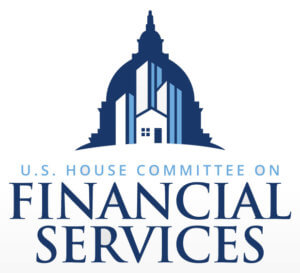Proposed Legislation in Response to Recent Bank Failures Introduced
 U.S. House of Representatives Committee on Financial Services Proposed Legislation in Response to Recent Bank Failures Introduced
U.S. House of Representatives Committee on Financial Services Proposed Legislation in Response to Recent Bank Failures Introduced
June 21, 2023 – Several bills to respond to the recent failures of Silicon Valley Bank (SVB), Signature Bank, and First Republic Bank have been introduced in the U.S. House Committee on Financial Services. Such proposals include:
- H.R. 4208, Failed Bank Executives Accountability and Consequences Act, expanding bank regulatory authority with respect to clawing back compensation, imposing fines, and banning future work in the industry for bank executives that negligently contribute to their bank’s failure.
- H.R. 4209, Incentivizing Safe and Sound Banking Act, which would expand bank regulator authority to prohibit stock sales of bank executives, when appropriate, when issuing a cease-and-desist order to a bank for not complying with the law, and automatically restricting such stock sales by senior executives of large banks if it receives poor exam ratings or does not resolve supervisory citations, such as a matter requiring immediate attention, in a timely manner.
- H.R. 4210, Closing the Enhanced Prudential Standards Loophole Act, which imposes Dodd-Frank’s enhanced prudential standards on banks without bank holding companies.
- H.R. 3992, Effective Bank Regulation Act¸ which requires bank regulators to expand their stress testing requirements. Specifically, rather than doing two stress test scenarios, the bill would require five, and ensure that the Federal reserve does stress tests for situations when interest rates are rising or falling.
- H.R. 4206, Bank Safety Act, which would prevent large banks from opting out of the requirement to recognize Accumulated Other Comprehensive Income (AOCI) in regulatory capital, which primarily reflects the kind of unrealized losses Silicon Valley Bank had with its securities portfolio.
- H.R. 3914, Failing Bank Acquisition Fairness Act, which would ensure smaller banks can purchase failed banks by directing the FDIC to only consider the bids of a megabank with more than 10% of total deposits if no other institutions meet the least cost test to the FDIC.
- H.R. 4116, Systemic Risk Authority Transparency Act¸which requires that for any use of the systemic risk exception of FDIC’s least cost resolution test, this bill would require banking regulators and the Government Accountability Office (GAO) to produce the same kind of post-failure lessons learned reports that the Federal Reserve, FDIC, and GAO did in the aftermath of Silicon Valley Bank’s and Signature Bank’s failure. Initial reports would be due within 60 days after the systemic risk exception is triggered, with more comprehensive reports due within 180 days.
- H.R. 4204, Shielding Community Banks from Systemic Risk Assessments Act, which would permanently exempt banks with less than $5 billion in total assets from special assessments the FDIC must collect when a systemic risk exception is triggered. The bill would allow FDIC to set a higher threshold if warranted while requiring a minimal impact on banks with between $5 billion and $50 billion in total assets.
- H.R. 4062, Chief Risk Officer Enforcement and Accountability Act, which would codify regulatory requirements that large banks have a Chief Risk Officer (CRO). The bill also requires within 24 hours of a large bank’s CRO position being vacant, the bank must notify their federal and, if applicable, state prudential regulator of such vacancy. Within 7 days, they must submit a plan to their regulator on how they would search for and promptly hire a well-qualified CRO when there is a vacancy. After 60 days, if the CRO position remains vacant, the bank must notify the public and be subject to an automatic cap on their asset growth until such vacancy is cured.
- H.R. 4200, Fostering Accountability in Remuneration Fund Act of 2023, or FAIR Fund Act, which would require large financial institutions to have a portion of senior executive compensation placed into a deferred compensation pool that would get paid out between 2 years and 8 years depending on the size of the large financial institution. In the case of a company’s failure and/or executive misconduct, the fund would be used to cover the costs of paying any fines or resolving the firm. This would supplement incentive-based compensation rules required under Section 956 of Dodd-Frank.
- H.R. 4207, Stopping Bonuses for Unsafe and Unsound Banking Act¸which would restrict discretionary bonus payments to executives of any large bank does not resolve a Matter Requiring Immediate Attention or a similar supervisory citation from bank supervisors in a timely manner. Specifically, a bonus freeze would kick in if they do not submit an acceptable remediation plan by a submission deadline set by the regulators, and furthermore, a bonus freeze would take effect if they do not implement the remediation plan by the implementation deadline set by the regulators.